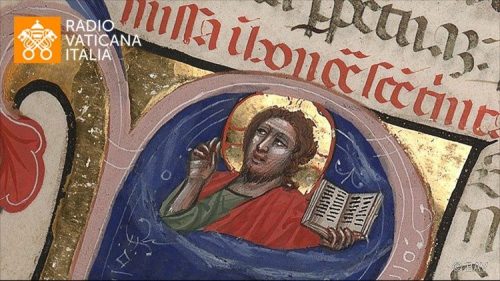READING OF THE DAY
GAL 5:1-6
Brothers and sisters:
For freedom Christ set us free;
so stand firm and do not submit again to the yoke of slavery.It is I, Paul, who am telling you
that if you have yourselves circumcised,
Christ will be of no benefit to you.
Once again I declare to every man who has himself circumcised
that he is bound to observe the entire law.
You are separated from Christ,
you who are trying to be justified by law;
you have fallen from grace.
For through the Spirit, by faith, we await the hope of righteousness.
For in Christ Jesus,
neither circumcision nor uncircumcision counts for anything,
but only faith working through love.
GOSPEL OF THE DAY
LK 11:37-41
After Jesus had spoken,
a Pharisee invited him to dine at his home.
He entered and reclined at table to eat.
The Pharisee was amazed to see
that he did not observe the prescribed washing before the meal.
The Lord said to him, “Oh you Pharisees!
Although you cleanse the outside of the cup and the dish,
inside you are filled with plunder and evil.
You fools!
Did not the maker of the outside also make the inside?
But as to what is within, give alms,
and behold, everything will be clean for you.”
WORDS OF THE HOLY FATHER
The “religion of appearances” or the “path of humility”? In the homily at Mass in the Chapel of Santa Marta […], Pope Francis indicated a decisive choice in the life of every Christian: that even when “doing good”, we can indeed meet with a dangerous misunderstanding – which is that of putting ourselves first – rather than “the redemption that Jesus has given us”. The goal is to affirm “our interior freedom”, by showing ourselves to the world as we really are in our hearts, without easy or clever operations of having a masked exterior of “makeup”.
The Pontiff’s reflection began with the concept of freedom. His inspiration came from the first reading in the liturgy of the day (Gal 5:1-6), in which the Apostle Paul invites us to “stand fast therefore, and do not submit again to a yoke of slavery – that is, to be free: free in religion, free in adoring God”. This was the first lesson: “Never lose your freedom”. Which freedom? “Christian freedom only comes from the grace of Jesus Christ”, the Pope explained, “not by our works, not by our so-called ‘justice’, but from the justice that the Lord Jesus Christ gave us and with which he re-created us”. A justice, he added, that “comes precisely from the Cross”.
This theme was also highlighted in the Gospel passage of the day (Lk 11:37-41), where we read of Jesus rebuking a Pharisee, a doctor of the law. He scolds Jesus because, the Pope recalled, “this Pharisee has invited Jesus to lunch and Jesus does not make ablution, in other words, he does not wash his hands”: therefore he does not fulfil those practices “which were the customs of the old law”. Faced with certain grievances, the Lord affirms: “You Pharisees clean the outside of the cup and dish, but inside you are full of greed and wickedness”. It is a concept, Francis noted, that Jesus “repeated many times in the Gospel”, offering certain people a clear warning: “Your interior is bad, it is not just, it is not free. You are slaves because you have not accepted the justice that comes from God”, which is “the justice that Jesus gave us”.
In another passage we read that Jesus, after encouraging prayer, also teaches us how to do it: “in your room, so that no one sees you, so that only your Father sees you”. The invitation, therefore is “not to pray for the sake of appearances”, in order to be seen, as that Pharisee did, who — the Gospel always tells us — said before the altar of the temple: “God, thank you, Lord, that I am not a sinner”. Those who acted in this way, the Pontiff said, were truly those with “brazen faces” and they “had no shame”.
In contrast to some attitudes, Jesus offers a suggestion, which the Pope summarized in this way: “When you do good and give alms, do not do so in order to be seen. Your right hand should not know what the left hand is doing. Do it in secret. And when you do penance, and fast, please see that you are not melancholy, do not be dismal so that the whole world knows you are doing penance”. Ultimately: what matters “is the freedom that redemption offered us, which gave us love, which gave us the re-creation of the Father”. It is an interior freedom, which leads to doing “good in secret, without sounding the trumpet”: indeed, “the way of true religion is the same way of Jesus: humility, humiliation”. Inasmuch that Jesus — the Pope said, quoting the Letter of Paul to the Philippians — “humbled himself, he emptied himself”. And, the Pontiff added: “this is the only way to take selfishness, greed, arrogance, vanity and worldliness, away from us”.
Faced with this example we find instead the attitude of those whom Jesus reproaches: “people who follow the religion of makeup: the appearance, to appear, pretending to seem” a certain way “while inside…”. The Pope pointed out the “very powerful image” that Jesus evokes: “‘You are whitewashed tombs, which outwardly appear beautiful, but within are full of dead men’s bones and all uncleanliness’”. On the other hand, “Jesus calls us, inviting us to do good with humility”, because otherwise we fall into a dangerous misunderstanding: “You can do all the good that you want, but if you do not do so humbly, as Jesus teaches us, this good does not help, because it is a good that comes from yourself, from your self-assurance, and not from the redemption that Jesus gave us”. It is a redemption which, Francis said, arrives by means of “the path of humility and humiliation”: in fact “you can never reach humility without humiliation”. Thus, “we see Jesus humiliated on the cross”.
Hence the Pope concluded his homily with an exhortation: “Let us ask the Lord that we never tire of going down that path; that we never tire of rejecting this religion of appearances, this religion of seeming, of pretending…”. We must instead be committed to proceed “quietly, doing good”, and doing so “freely as we have freely received our interior freedom”.
(Santa Marta, 11 October 2016)

